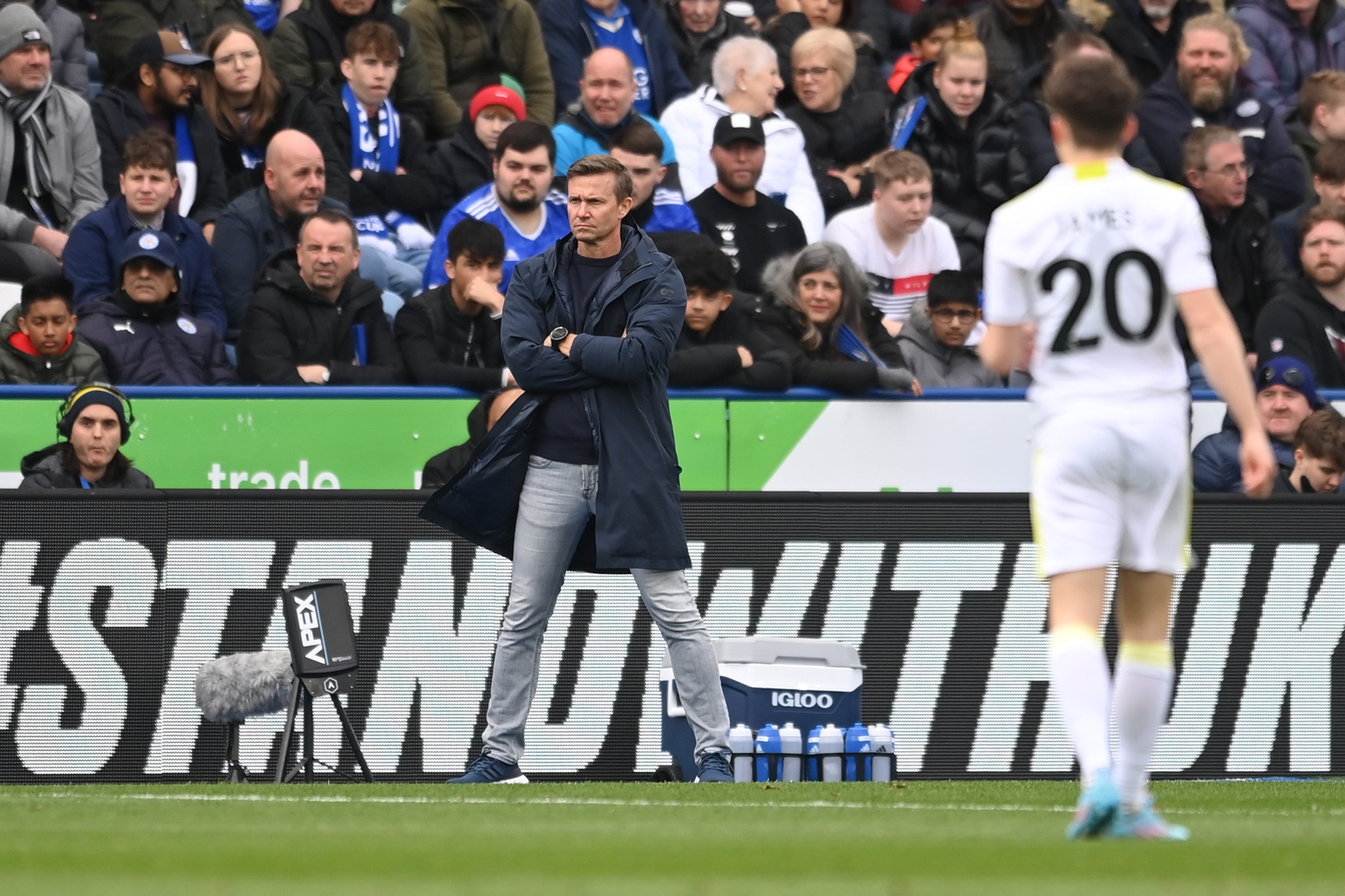Jesse Marsch: Tactical talking points as new Leeds manager loses to Leicester in first game
The former NYRB and RB Leipzig boss has had less than a full week to start putting his ideas in place

Four shots in the first 10 minutes. A four-man attack for most of the first half. If this was a sign of things to come, Leeds fans will quickly have more fast-paced, forward-thinking football to look forward to, albeit changed to the most recent era.
Jesse Marsch and his new team had already taken the attention all week in anticipation of how he could change their fortunes, how he’d live up to replacing the club’s iconic boss Marcelo Bielsa and how he’d bounce back from disappointment at Leipzig.
A 4-2-2-2 line-up immediately meant alterations, but so too did the changes in approach on and off the ball.
It resulted in a 1-0 defeat for the new head coach against Leicester, but the scoreline doesn’t tell the story of a game his side were better in - as the xG ‘score’ of 0.37 - 2.11 attests to.
Here we take a look through the tactical notes and main differences on show at the King Power Stadium.
Line of four
When Leicester were playing out from Kasper Schmeichel and his defence, Leeds’ top end almost looked like a table football set-up - just one player missing.
All four were close-knit and strutctured, ready to press in a unit and block off the passing lanes out of the home side’s defence, but also with a clever element of rotation about them.
Nominally it was Rodrigo and Dan James as the top two with Raphinha and Jack Harrison as the wider, deeper pair, but lots of swapping went on thanks to the comfort and career history of each: Rodrigo was a wide forward in Spain, Raphinha played centrally with Rennes, Harrison the same in MLS and James was a winger when Leeds originally wanted to sign him.
The combination play between them at times was extremely impressive, one-touch moving off each other to work angles around the Leicester defence.
Nothing new there - fast link-up and breaking into space was a Bielsa hallmark, though a notable aspect of this game was Raphinha being on the margins of that play at times.
More to come, including - Marsch will hope - a finishing touch. Patrick Bamford being back on the bench might be a step in that direction.
Cohesion in defence
Both halves of the pitch showed evidence of a change in approach: a high press early on, all four attackers in unison and the central pivot pushing up behind them. Later, when the hosts had more possession toward the end of the first half, the deeper Leeds line looked initially well-drilled and able to cope with Leicester’s fairly slow speed of play.
Organisation in deep zones looked much better for the most part and there was no sign of full-backs racing into channels on the opposite side of the pitch to track their man, as the individual direct marking jobs of the last few years were quickly abandoned.
A Leicester counter on 64 minutes showed fast reorgansation and understanding too: off another poor Leeds corner, shape was kept even if personnel were different and stand-in left-back Jack Harrison ended up making the challenge.
There’s definitely an element of this which was down to what was a dreadfully inert Leicester showing at times, but Ilan Meslier was for once underworked. The Foxes and Brendan Rodgers are probably fortunate that the post-match assessment will be heavily Leeds-focused today, as it was frequently dismal once more from them on home soil.
One moment without concentration proved the team’s undoing: Stuart Dallas, an otherwise strong performer, failing to track the runner after a one-two in the box - and Leicester scored.

Midfield overloaded
Positives in both halves then, but a big old gap in the middle which could have been a bigger problem earlier on and certainly will be against a better team, if not altered.
When that front four was bypassed by a quick passing exchange or overlapping runner, it left two versus three in midfield at best.
More frequently, it was actually one Leeds man in the middle.
This came because the full-backs are not wild, galloping, relentless overlappers in this system, but rather support acts most often. When stationed deep, it was one centre midfielder who therefore had to filter wide, Robin Koch often closing down the Leicester full-back right by the left touchline for example.
A quick shift infield would have left a three-on-one at times and 40 yards of space to play into; as it happens, Leicester’s right-back was Hamza Choudhury who instead mostly lost possession and committed fouls.
This will likely be a full-back organisational and structure issue more than anything; they’ll have to support play a little higher, or station infield slightly to prevent wild overloads against faster, better transition sides.
Otherwise, the box midfield has to work far closer together, resulting in Raphinha and Harrison dropping closer to the pivot instead of pushing up to the front two out of possession.
Set-piece practice
Week one of Marschball training was clearly shape off the ball and transition play.
Week two should include some set-piece work.
Corners were claimed by the goalkeeper or overhit, while free-kick deliveries tended to be either straight and difficult to do anything with, or else wildly underhit and easily cleared.
One near-post header from Rodrigo was the only occasion which saw anything positive result from a lot of set play opportunities.
At the other end, Leeds have been outright bad at defending set-pieces this season, but similarly only gave up one reach chance this time - a Wilf Ndidi header, saved
Individual inaction
Nothing much that Marsch can do about this over the next few months as the squad is the squad and the transfer window is shut, but there may well be an element here about a more team-based structure unearthing one or two players being not quite up to standard.
Under Bielsa, energy and dynamism played a huge role in the team’s approach on an individual level, whereas Marsch in New York and Salzburg in particular has emphasised group positional play as a major facet of his team structure.
It’s important to remember a lot of these Leeds players were Championship-standard for a long time, so although they now have top-flight game experience, it was still in the set-up of how they were playing in the second tier.
Form and quality cannot be judged on any single game in isolation, but there were a few who were below the needed level from a technical perspective on the day - that has to change fast, because points are now all-important in the closing weeks of the season for Leeds to avoid a drop back down from the Premier League.
Join our commenting forum
Join thought-provoking conversations, follow other Independent readers and see their replies
Comments
Bookmark popover
Removed from bookmarks